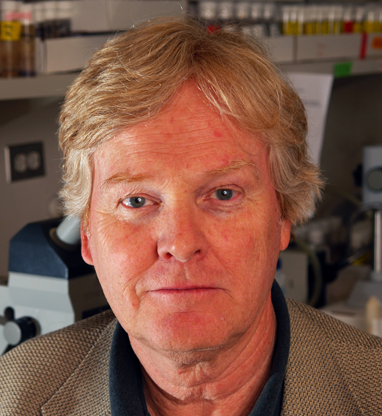Young wins Nobel Prize
in medicine or physiology
at the Rockefeller University and and at Brandeis University have won the for their discoveries of molecular mechanisms controlling circadian rhythm.
The oscillations of the circadian rhythm are responsible for the regular, daily functioning of countless biological processes, including sleep, metabolism, hormone regulation and body temperature. By exploring the process in fruit flies, the Nobel laureates isolated the gene that drives the oscillations by encoding a protein that accumulates in cells during the day and is degraded at night. This daily cycle, by which cellular clockwork is coupled to the Earth’s, has since been observed in plants, animals, fungi and cyanobacteria.
 Michael W. Young
Michael W. Young
The Nobel Assembly at Karolinska Institutet in Sweden, which issues the prize, in a press release noted that “the seminal discoveries by Hall, Rosbash and Young have revealed a crucial physiological mechanism explaining circadian adaptation, with important implications for human health and disease.”
Young, a member of the ╔¼└’Ę¼ and the National Academy of Sciences, earned his B.A. in biology in 1971 and his Ph.D. in genetics in 1975 at the University of Texas at Austin. He followed that up with a postdoc at Stanford University. He has been a faculty member at Rockefeller since 1978.
Young will share one-third of the $1.1 million prize with Rosbash and Hall.
“In 1930, George and Ira Gershwin published their famous jazz song, ‘I Got Rhythm.’ Well, it turns out, we all got rhythm. Even the simple fruit fly got rhythm. And, amazingly, it’s the same rhythm,” says , an endowed professor at Weill Cornell Medical College and professor emeritus at Brandeis.
Petsko continued: “(Circadian rhythm) explains why we sleep when we do and why we feel wiped out when we take a long airplane trip across many time zones. It is one of the most fundamental processes in all higher organisms. (T)hanks to the laureates, we now know the words and lyrics — i.e, the mechanism — of that rhythm as well as we do that of the Gershwins.”
Enjoy reading ASBMB Today?
Become a member to receive the print edition four times a year and the digital edition monthly.
Learn moreGet the latest from ASBMB Today
Enter your email address, and weŌĆÖll send you a weekly email with recent articles, interviews and more.
Latest in People
People highlights or most popular articles

Hidden strengths of an autistic scientist
Navigating the world of scientific research as an autistic scientist comes with unique challenges ŌĆömicroaggressions, communication hurdles and the constant pressure to conform to social norms, postbaccalaureate student Taylor Stolberg writes.

Richard Silverman to speak at ASBMB 2025
Richard Silverman and Melissa Moore are the featured speakers at the ASBMB annual meeting to be held April 12-15 in Chicago.

WomenŌĆÖs History Month: Educating and inspiring generations
Through early classroom experiences, undergraduate education and advanced research training, women leaders are shaping a more inclusive and supportive scientific community.

ASBMB honors Lawrence Tabak with public service award
He will deliver prerecorded remarks at the 2025 ASBMB Annual Meeting in Chicago.

ASBMB names 2025 JBC/Tabor Award winners
The six awardees are first authors of outstanding papers published in 2024 in the Journal of Biological Chemistry.

Daniel N. Hebert (1962ŌĆō2024)
Daniel HebertŌĆÖs colleagues remember the passionate glycobiologistscientist, caring mentor and kind friend.

